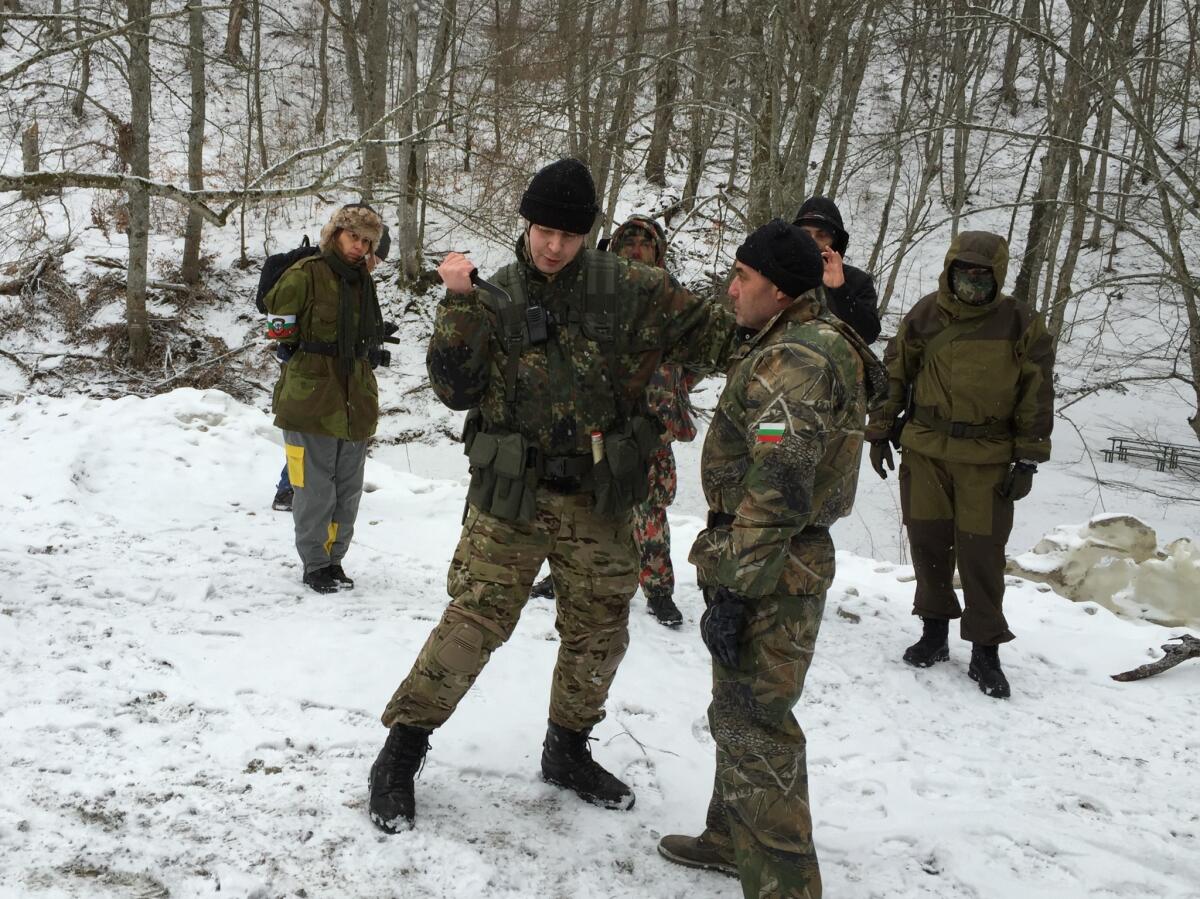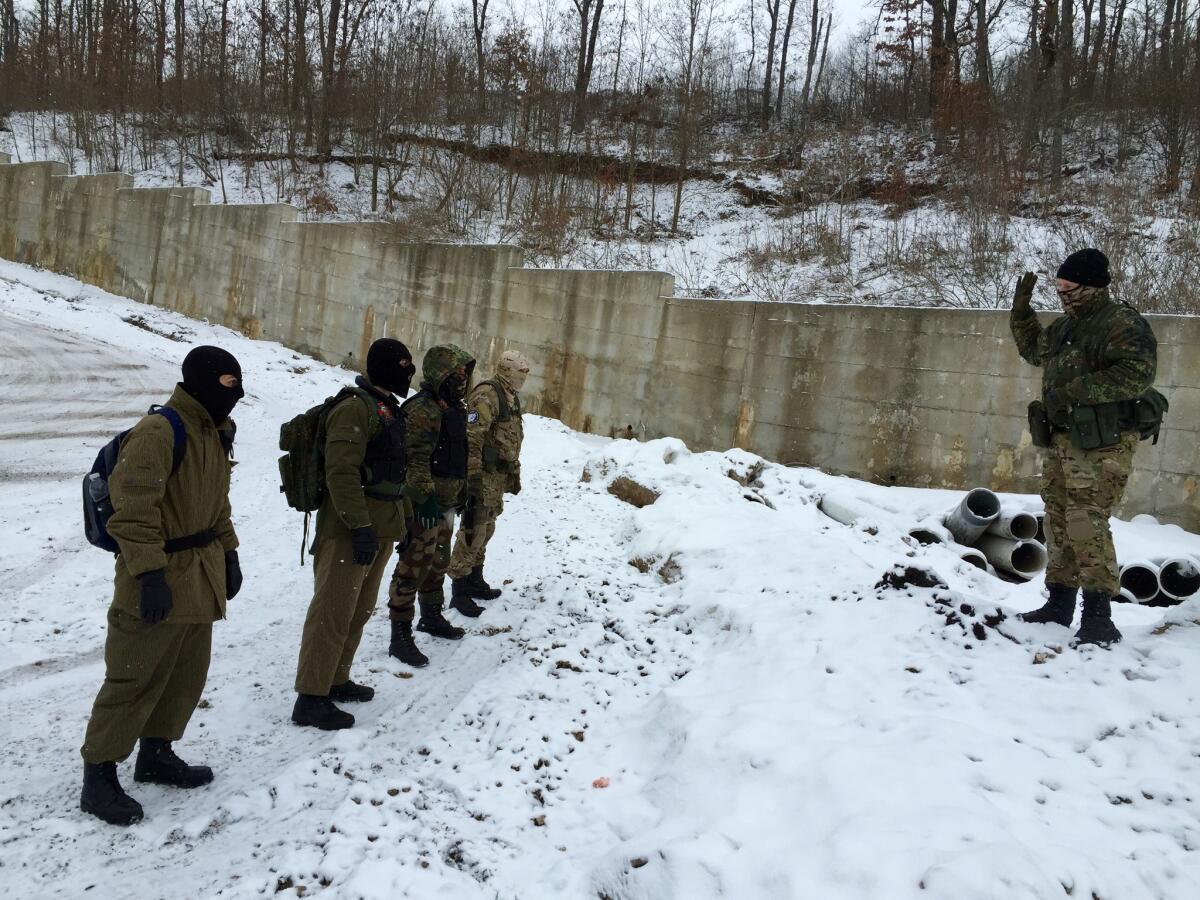Vigilantes prowl Europeâs border with a target: Muslim migrants

A group of far-right Bulgarian vigilantes is trying to keep Muslim migrants out of Europe.Â
Reporting from Zvezdets, Bulgaria â They gathered in a snowy forest dressed in their menacing best: combat fatigues and military-style boots, their faces obscured by ski masks.
One group jogged off into a thicket of beech trees while another watched an instructor demonstrate, with a 6-inch hunting knife, the proper technique for stabbing an assailant in the chest and throat.
The training session in the rolling woods near the Turkish border was not a military exercise, and the participants were not soldiers or police. They were members of a far-right vigilante group with a simple goal: stopping Muslim migrants from entering Europe.
The desperate flight north by Syrians, Afghans, Iraqis and others has sparked a backlash here along the European Unionâs southeastern border, where the Bulgarian vigilantes see themselves as a front-line force against the threat of Islamist radicals infiltrating the West.
There is scant evidence that extremists are posing as refugees or migrants to penetrate this border, which is guarded by a partial fence, Bulgarian police and a small European contingent. But that has not dampened the zeal of the volunteer brigade known as the Committee for National Rescue.
Alarmed by what they describe as overly permissive European policies on immigration, the vigilantes have tapped into a deep vein of xenophobia across the continent. Their English website calls on Europe-born citizens to âhelp close and defend the southern border ⌠from the hordes of radical fake Islam adherents, terrorists and [Islamic State] fighters pouring in and headed for Europe.â
âWeâre ready for a war,â said Vladimir Rusev, a burly former military man who is one of the groupâs founders. âWeâre guarding against criminals and terrorists who are working against the interests of Europe and the United States.â
His organization â which on a recent weekend mustered about 40 camo-clad men and two women at a rustic guesthouse three miles from the border â claims to have 800 volunteers patrolling at any given time.
They have prevented hundreds from crossing the 140-mile border illegally, sending them back to Turkey or handing them over to Bulgarian authorities, Rusev said.

Bulgarian police and Frontex, the European border enforcement agency that has deployed 88 officers here, said they had no information about how many migrants had been stopped by civilians. The number of migrants reaching Europe plunged sharply in 2016, when authorities detected approximately 3,000 illegal crossings at the Bulgaria-Turkey border, half as many as in 2015.
Rusev said they arenât a paramilitary force because they donât carry lethal firearms, and they donât stop Syrian refugees or genuine asylum seekers. But they chronicle their exploits vigorously on YouTube, where one undated video shows masked volunteers rounding up about 20 bewildered-looking young migrants.
In other clips, often set to driving Bulgarian rock music, group members practice at gun ranges, engage in light calisthenics or stride through the forest with pellet guns, crossbows and walkie-talkies â and wearing armbands emblazoned with their mascot, a wolf.
They praise President Trump, whose effort to ban citizens of seven (later amended to six) mainly Muslim countries from entering the United States was âan important measure,â Rusev said.
In a Europe on edge over the link between migration and terrorism, a nationalist fervor is spreading. The November 2015 Paris attacks were carried out by militants who traveled through Greece posing as refugees, while the man suspected of driving a truck into a Christmas market in Berlin last December was a rejected asylum seeker from Tunisia.
Anti-immigration candidates are poised for strong election showings in the Netherlands and France. In Hungary, police want to arm 3,000 civilian âborder huntersâ with batons and pepper spray to repel migrants.
In Bulgaria, several vigilantes and groups have gained notoriety for arresting migrants and posting videos online. The former prime minister at one point said he welcomed the efforts.
Rusevâs organization is believed to be the largest and most established. Far-right activists from Germany and the Netherlands have joined his men on patrols. A prominent white nationalist in Britain, Jim Dowson, made a video here last fall asking supporters to aid in the effort to stop migrants.
âYou either stop them in Bulgaria, or youâll have to stop them in Birmingham, or Bonn or Brussels,â Dowson said.
Rusev lamented that the appeal yielded only a few bulletproof vests, night-vision goggles and a drone. Despite soliciting donations online, he said they pay for transportation, equipment and the occasional weekend training meeting out of their own pockets.
âSadly we do not receive any help from any country in the world, nor from the Bulgarian government,â Rusev said. âWe finance ourselves with our own salaries and pensions.â
In his 50s, balding and with a neatly trimmed mustache, Rusev offered few details of his background except that he left the army after his wife was injured in a car accident and now runs a construction business.
His organization is made up of two branches that date to Bulgariaâs struggle to overthrow five centuries of rule by the Ottomans, an Islamic empire based in Turkey. The civilian wing, Shipka, is named for a 19th century battle in which Russian troops and Bulgarian volunteers defeated Ottoman forces; a unit made up of ex-military men is dubbed Vasil Levski, after an independence hero.
Mistrust of Turks runs deep among the members, who view the Ottoman period as a dark era of enslavement by Muslim outsiders.
âThatâs the world I want to keep from harming my family and my child,â Radoslav Kamenov, a 34-year-old warehouse worker with an 8-year-old daughter, said over a dinner of grilled fish and potatoes during the training weekend.
âI donât want to see my people falling again under foreign occupation. I donât want to see my culture eradicated.â
Bulgaria granted refugee or protected status to 1,341 of the 19,418 people who applied for asylum in 2016, according to official statistics. Still, Kamenov and others worried their country was awash in foreigners.

The volunteers include Bulgarian-born Muslims, who make up 8% of the countryâs roughly 7 million people, but are seen as practicing a more moderate form of Islam than migrants from the Middle East and South Asia. Most Bulgarians are Orthodox Christians.
At the meeting, a Muslim volunteer, an imposing 46-year-old baker named Kamel Ismail, noticed an American reporter and asked, âAre you Taliban?â
Informed that the reporter had Indian roots, Ismail wondered why he wasnât wearing a Hindu religious decoration on his forehead. Pointing two fingers as if aiming a pistol, he offered to leave one âby firing a couple of bullets.â (He later clarified that he was joking.)
In a corner of the woodsy dining room, Rusev switched on a television and played a documentary on Islamic State supporters in Britain. He worried aloud that such people, if allowed in their country, could radicalize Bulgarian Muslims.
âWe will not allow ourselves or our brothers to be harmed by this terror,â Rusev said as a man onscreen brandished a black Islamic State flag. âWe will drive these bastards out.â
The gathering had the flavor of a particularly zany John Birch Society meeting â at one point Rusev suggested that Sen. John McCain (R-Ariz.) had co-founded Islamic State â mixed with a Boy Scout camp out. One volunteer showed how to fashion a slingshot. In the morning, under a light snowfall, the group practiced lighting a fire and heating military rations to prepare themselves for overnight patrols.
They generally avoid Bulgarian border police officers, who sometimes stop the volunteers and note down their names but have not taken steps to rein in their activities.
The Bulgarian Helsinki Committee, a leading human rights advocacy group, says the vigilantesâ calls for armed action and anti-migrant propaganda violate the constitution. It filed petitions last year to have the Shipka and Vasil Levski groupsâ nonprofit licenses canceled, but the Bulgarian prosecutorâs office so far has declined to bring a case.
Margarita Ilieva, a lawyer with the rights organization, said many Bulgarians share the vigilantesâ antipathy to migrants. Researchers have documented a rise in hate speech toward Muslims in particular.
âThere is no politician or public figure in power who has opposed hate speech because it would be so unpopular and so costly politically,â Ilieva said. âThe police take their cues and are turning a blind eye to the militias. They allow them to play their games and only ask them not to overstep too much.â
The Helsinki committee â whose chairman, Krassimir Kanev, has been assaulted and spat upon in public â is a favorite target of nationalists including Rusev, who said human rights groups prioritize the protection of migrants over native Bulgarians.
Rusev also criticized the border police, whose officers have been found taking bribes from human smugglers. Last summer two top officials resigned after it emerged that the police gave a contract for transporting detained migrants to a businessman who had been connected to a smuggling ring.
âTheyâre supposed to be stopping illegal immigration but theyâre doing the exact opposite,â Rusev said.
As the meeting drew to a close, the volunteers had an idea. Several men donned white plastic jumpsuits â snow camouflage â and ran to the hills near where a handful of border police were parked in a truck. The goal was to show the officers that migrants could be tricky.
They weaved between the bare trees, then lay waiting for several moments. Finally they jumped up and ran toward the police, waving their arms and shouting.
The officers looked on, but did nothing.
Follow @SBengali on Twitter for more news from South Asia
ALSO
East Mosul may be free from Islamic State control, but itâs far from secure
Defense lawyers say Mexican drug kingpin Joaquin âEl Chapoâ Guzmanâs health has deteriorated
Scotlandâs leader to seek new independence referendum
More to Read
Sign up for Essential California
The most important California stories and recommendations in your inbox every morning.
You may occasionally receive promotional content from the Los Angeles Times.











